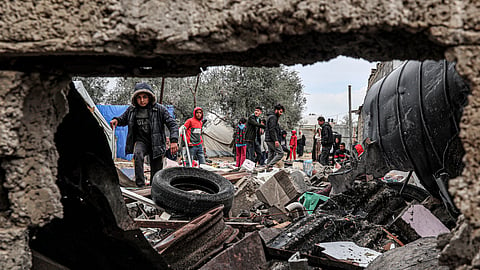

GENEVA: The United Nations (UN) said on Tuesday that Israel's severe restrictions on aid to war-ravaged Gaza, coupled with its military offensive, could amount to using starvation as a "weapon of war," which would be a "war crime."
UN human rights chief Volker Turk denounced the rampant hunger and looming famine in Gaza.
In a statement slammed by Israel, Turk said that "the situation of hunger, starvation and famine is a result of Israel's extensive restrictions on the entry and distribution of humanitarian aid and commercial goods."
It was also linked to the "displacement of most of the population, as well as the destruction of crucial civilian infrastructure," he said.
"The extent of Israel's continued restrictions on the entry of aid into Gaza, together with the manner in which it continues to conduct hostilities, may amount to the use of starvation as a method of war, which is a war crime."
His spokesman, Jeremy Laurence, told reporters in Geneva that the final determination of whether "starvation is being used as a weapon of war" would be determined by a court.
Imminent famine
The comments came after a UN-backed food security assessment determined that the war-torn Palestinian territory is facing imminent famine.
The devastating war since Hamas's October 7 attack on Israel has left roughly half of Gazans—around 1.1 million people—experienced "catastrophic" hunger, the assessment warned.
Without a surge of aid, famine would hit the 300,000 people in Gaza's war-battered north by May, it said.
The finding comes just over five months into the Gaza war, which erupted after Hamas's October 7 attack that killed about 1,160 people in Israel, mostly civilians, according to an AFP tally of Israeli official figures.
Militants also seized about 250 hostages, of whom Israel believes 130 remain in Gaza, including 33 who are presumed dead.
Israel's retaliatory offensive against Hamas has killed more than 31,800 people, most of them women and children, according to Gaza's health ministry.
Jens Laerke, spokesman for the UN humanitarian agency OCHA, pointed to the difficulty of clearly determining if the strict criteria have been met to declare a famine.
"The famine thresholds may already be the case in northern Gaza," he told reporters, highlighting that for weeks people had already been reduced to eating bird seed, animal fodder, wild grass and weeds.
"There is literally nothing left," he said.
Looking ahead, he warned that without more aid, Gaza could soon be looking at "more than 200 people dying from starvation per day."
'Clock is ticking'
Already, health workers are seeing "newborn babies simply dying because of their too-low birthweight" and "children that are at the... brink of death through starvation," World Health Organisation spokeswoman Margaret Harris said.
She noted that malnutrition had been basically "non-existent" in Gaza before the war.
The crisis was "entirely manmade," she said, denouncing the lack of safe access to bring in the aid needed to meet the towering needs.
Turk said that "the clock is ticking."
"Everyone, especially those with influence, must insist that Israel acts to facilitate the unimpeded entry and distribution of needed humanitarian assistance and commercial goods to end starvation and avert all risk of famine."
He demanded "an immediate ceasefire, as well as the unconditional release of Israeli hostages still held in Gaza".
Israel's diplomatic mission in Geneva rejected Turk's statement, insisting that he was seeking "once again to blame Israel for the situation and completely absolve the responsibility of the UN and Hamas."
"Despite the rockets, the holding of our hostages, the acts of pure evil on October 7, Israel is committed to facilitating humanitarian aid into Gaza," it said, insisting that "Israel is at war with Hamas, not the Palestinian people."
The country, it said, was "doing everything it can to flood Gaza with aid, including by land air and sea."
"The UN must also step up."